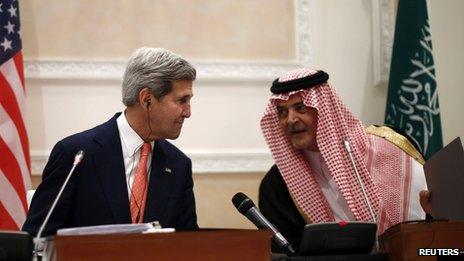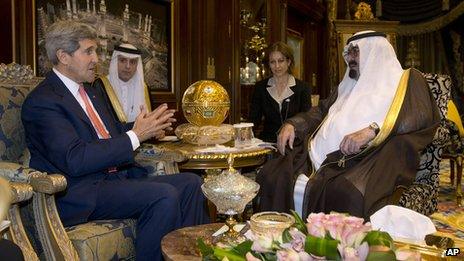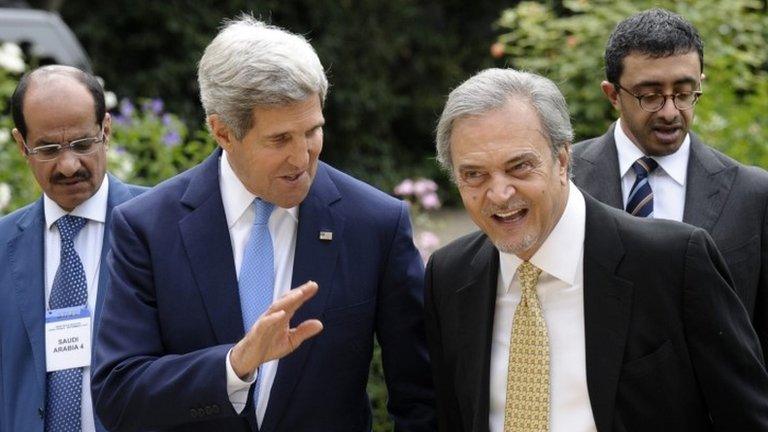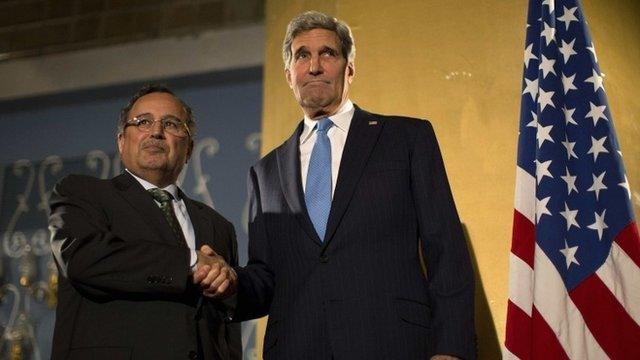John Kerry praises US-Saudi ties as 'enduring'
- Published

Saudi Foreign Minister Prince Saud played down recent disagreements with the US
US Secretary of State John Kerry, visiting Saudi Arabia, has said ties between the two nations are "strategic" and "enduring".
There were "no differences" between them on Syria, Mr Kerry said.
US ties with its long-standing ally have been frayed by the Syrian conflict and recent US policy on Iran.
Speaking at a joint news conference with Mr Kerry, Saudi Foreign Minister Prince Saud al-Faisal also played down recent tensions.
The prince described the two nations as "friendly countries" with a relationship based on "sincerity, candour and frankness," according to Associated Press.
Saudi Arabia is an important diplomatic and trading partner for the US.
'Senior player'
The kingdom is reportedly unhappy that peace talks over Syria could lead to an Iran-backed government in Damascus.
Riyadh is also concerned about a US-Iran rapprochement as they try to resolve the dispute over Tehran's nuclear programme.
Mr Kerry is in the Saudi capital as part of a regional tour. He described Saudi Arabia as the "senior player" in the Arab world, along with Egypt.

John Kerry also met Saudi Arabia's King Abdullah while in Riyadh
He first made an unscheduled stop in Egypt, where he called for an end to violence and a move to full democracy.
Mr Kerry also said the US was committed to working with Egypt's new rulers.
Egypt is one of the issues that have caused tension between Saudi Arabia and the United States in recent months.
Washington froze some of the $1.3bn (£810m) it gives in aid annually to Egypt when the democratically elected president Mohammed Morsi was ousted by the army earlier this year. Saudi Arabia has thrown its support behind the new military-backed government.
It had earlier been widely reported that the Saudi intelligence chief, Prince Bandar bin Sultan, had told European diplomats his country would be making "a major shift" in its relations with the US.
'Anti-American sentiment'
Speaking in Cairo before he flew to to Riyadh, Mr Kerry said he would not allow countries like Saudi Arabia, Jordan and Egypt to be "attacked from the outside" - a message which was viewed by some as a veiled reference to Iran.
John Kerry: "The future... will be defined by the combination of stability and economic growth"
He also stressed the need for Egypt to move toward democracy.
"History has demonstrated that democracies are more stable, viable and prosperous than any alternative," he told a news conference.
"With stability comes tourism and investment, and with both come jobs."
His visit to Cairo was not disclosed by US officials until he landed. It is the first time a US secretary of state has travelled to Egypt on a visit that is unannounced for security reasons.
The BBC's Kim Ghattas, travelling with Mr Kerry, says it is the kind of precaution that characterises trips by US officials to countries like Afghanistan and Iraq.
This is a sign of US concerns about continued instability in the country, but it is also a reaction to the high level of anti-American feeling in Egypt, our correspondent says.
Spying allegations
Mr Kerry said Egypt's fortunes, and its bilateral relations, depended on its democratic transition.
He said that the US was "committed to work with" the interim government.
Mr Kerry's nine-day trip will take in a number of countries in the region and in Europe, including the United Arab Emirates, Algeria, Morocco, Jordan and Poland.
The secretary of state will also meet Israeli and Palestinian leaders to discuss the peace process in Jerusalem and Bethlehem.
Correspondents say Mr Kerry may have to face difficult questions over allegations of widespread US spying.
In the wake of revelations sparked by leaks from ex-US intelligence contractor Edward Snowden, Mr Kerry said last week that spying by the US National Security Agency may have gone too far.
- Published23 October 2013

- Published3 November 2013

- Published4 October 2019